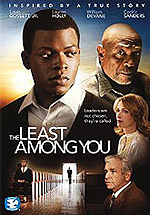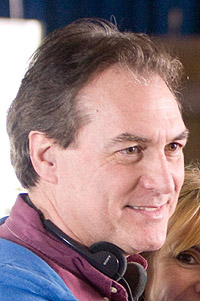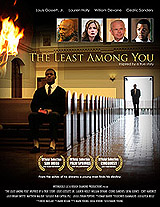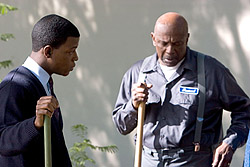 Mark Young (Director - The Least Among You')
Mark Young (Director - The Least Among You')
'The least among you will be the greatest in the Kingdom.'
Inspired by the true story of a falsely accused black college graduate forced to serve probation in an all-white seminary in the 1960s, 'The Least Among You' debuts on DVD, Digital Download and On Demand August 24, 2010 from Lionsgate.
Indeed, it is not an unfamiliar or impossible for a film director to make a movie that makes the audience think. Writer and director Mark Young is no exception to this, evidenced by his film, 'The Least Among You,' which is based on the true story of the Reverend Dr. Charles Marks.
In an interview with Exclusive Magazineís Ashley Trombley, Mr. Young discusses the challenges of helming a movie, about the filmís spiritual undertones, and mentorship.
WHAT GOT YOU STARTED IN FILMMAKING IN THE FIRST PLACE? "It kind of unveiled itself slowly. I was the senior VP of marketing and sales in several companies, and then the company I was with in the early nineties crashed. And as I was interviewing as a sideline, I decided to write this script called The Least Among You. It was about the Reverend Charles Marks, whom I met a couple of years earlier at my church. Heíd come and given a really inspirational speech about overcoming racism. And I was just really taken by the relationship between Charles and the janitor in the basement."
"So I wrote the script, and thought Iíd just try to sell it, but years went by and I couldnít sell it. As the idea went through its own changes and crises, I decided to do something I wanted to do for a change. And in 2005, I decided to raise the money and make this film. I didnít just wake up one day and decide to become a filmmaker, but thatís just how it happened."
AND THATíS KIND OF HOW ALL GOOD PROJECTS START, ISNíT IT? SLOWLY? "Yeah. Some people get hit with lightning bolts of inspiration, and make quick radical moves, but generally people donít act that way. Especially when itís a huge turn in a life, people act conservatively to everything. They take the lower risk option, and eventually find themselves out at sea!"
HOW LONG DID IT TAKE YOU TO PRODUCE THIS PARTICULAR PIECE, ALTOGETHER? "It took about three years. Most of it was raising money. It took a couple years to raise the money, and about a year to make it, through pre-production, production, post production."
WHAT IS THE SIGNIFICANCE OF THE MOVIEíS TITLE? "Itís sort of a double entendre, it refers to both the janitor and to Richard Kelly, the main character. The are both viewed as the ďleastĒ in this environment, as well as in recognition, power, or authority, or that sort of thing. Itís a Christian way of looking at things, that whatís on the outside isnít important, but itís whatís on the inside. Itís based on a Biblical saying that ďThe least among you will be the greatest in the Kingdom.Ē So, itís just saying that the people God holds in esteem are the ones who are fighting the internal battles, not necessarily the ones who have the greatest wealth or fame."

THE LEAST AMONG YOU IS, FROM WHAT IíVE BEEN ABLE TO FIND, YOUR MAIDEN VOYAGE AS A DIRECTOR. WAS THERE A NERVOUSNESS THAT PRECEDED ITS RELEASE, JUST BECAUSE IT WAS YOUR FIRST? "Yeah, definitely. Initially, my whole focus was on the actors, and the really talented crew around us--the DP, the editor, the musical composer, and just living up to their expectations. This was a low-budget film that we did in eighteen days, and everybody took a real haircut salary-wise, but they all loved the story and wanted to help me get it out there. My audience was the people working on the film and the investors, and just doing the story justice. I figured that if we told the story the way we all saw it, it would tell itself, in a way."
IN ADDITION TO DIRECTING THE MOVIE, YOU WERE ALSO THE WRITER. WAS IT AT ALL DIFFICULT TO JUGGLE BOTH RESPONSIBILITIES OF SHOOTING THE FILM AND STAYING TRUE TO THE VISION YOU HAD IN YOUR HEAD OF IT? "Yeah. In an eighteen day shoot, we a hundred-and-eight page script, and were shooting six pages a day, which is at least double what normal budgeted movies shoot. Once on the set, the writer part goes away, and youíre really kind of the director and producer, so youĎre doing two things: One, is that youíre trying to get the scenes. Youíre shooting the scenes you need and working with the actors and the crew, and the second thing thatís going off in your head is a ticking clock. Youíre looking at your watch, youíre seeing how far we got today, how far we have to go, how weíre gonna get there."
"We had to get each day, we had to win eighteen days in a row. If you lose a day, then you lose significant scenes, and then you might not have a story left. So thatís the pressure, it was mostly time."
WHAT ATTRACTED YOU TO THE STORY OF CHARLES MARKS, THE INSPIRATON FOR THE CHARACTER OF RICHARD KELLY? "I just loved the idea that here this young student was, thrown into this situation he didnít want to be in, he was the presidentís guinea pig for breaking the color line at the seminary, he didnít want to be a pastor, but he couldnít tell anybody thatÖso that was part of the pressure. Then, he was trying to keep a low profile and skate through, but heís the center of attention everywhere, and the center of scorn, as well. And it was just wonderful to be part of Godís plan that Heíd planted this janitor there years before, knowing this young man was going to need a life raft. And I just thought the relationship between Charles and Samuel the janitor was just a beautiful one, and one of mentors."
"And that sort of grew out of when I had seen Charles speak that day, and I was sitting next to him at lunch, and I mentioned the idea of mentors, like ďwhere are they these days?Ē And I told him about my grandfather, and he said, ďthat reminds me of this janitor I knew a long time ago.Ē And thatís what inspired me about it all. Also, a lot of times we are called into the darkness of confusion of losing our identity in order to find ourselves. And on a spiritual level, thatís what was happening with him. That was the crucible he had to pass through to become the leader that he did. Especially in todayís society where everyone is always protecting their feelings, that preempts peopleís opportunities to go into deeper areas. Because to become leaders, everyone has to pass through crucibles of pain the unknown."

THEREíS A LINE OF DIALOGUE THAT PARTICULARLY STOOD OUT TO ME. RICHARDíS CHARACTER SAYS HEíS BEEN TAUGHT THAT ďSPIRITUAL TRANSFORMATION IS THE ROOT OF SOCIETAL CHANGES?Ē IS THERE MERIT TO THAT? "I think there is. You can see it on both sides of the fence, good and evil. When Martin Luther King did what he did in the 1950ís and 1960ís, he wasnít speaking to the black people. He was speaking to 90% of the white audience who were Christians and went to church every Sunday. He was speaking from the standpoint of, ďweíre of the same faith, we read the same Bible, we believe the same things, so how can we have this in front of us? How can we have racism? That doesnít compute.Ē And I think that, instead of condemning and damning people, he spoke to them at that deeper spiritual level. And I think thatís how people changed so quickly. I grew up in the South, and I saw the results of that even in my own household. Governments can legislate things all day long, but they canít legislate beliefs and feelings, so much. And then on the other hand, we saw people like Hitler. There was a spiritual transformation there, too. He tried to replace Christianity with the Teutonic religion of the blood. So thatís where that statement sort of comes from."
I WANT TO GO BACK FOR A SECOND TO THE STATEMENT YOU MADE ABOUT MENTORS. WHERE ARE THE MENTORS, DO YOU THINK? "Well, you know, part of it has been the breakdown of the families. Like, when I was growing up, the parents, grandparents, great-grandparents, aunts and uncles all lived within five miles of each other. And that doesnít happen anymore. So you have the availability of relatives being mentors not there as much. Secondarily, you have the ďme generationĒ of the 1960ís that are now running everything. And so theyíve grown up with this notion of taking care of ďmeĒ first. And I think also the fragmentation of communities, how people donít live in one place for very long. The mentors are out there, but theyíre isolated, or nobody listens to them, or theyíre among people theyíre own age."
AND YOU HAD SAID THAT SAMUEL TURNED OUT TO BE RICHARDíS MENTOR. WHO ARE YOURS? "Number one is my grandfather, Red Young. He was a brick-layer, and I worked for him for ten summers, from when I was about twelve until twenty-two. It was probably the most important job I ever had, because I worked alongside him in the hot Texas sun, and he was quite a man. He was a Popeye sort of guy, short cotton hair, big forearms, was in the Navy in World War II, survived being blown up by a hand grenade, and started his own little construction company. And he was just a man of a lot of wisdom, and love, and strength. But Iím lucky in that regard, with the opportunities Iíve had to learn from relatives and people in the community. I donít think young people have those opportunities anymore."

I DONíT THINK THEY DO EITHER. THIS MIGHT BE OVERREACHING, BUT IS IT POSSIBLE THAT THE CHARACTER OF SAMUEL BENTON IS MORE OF A ďHOLY SPIRITĒ TYPE OF PERSON, OFFERING GUIDANCE TO A TORTURED YOUNG MAN? "Yeah, thatís exactly right. Right off the bat, he tells Richard not to fight fire with fire, donít go to war with people, itís not about that. And what he and Bessie are telling him is that we struggle not against flesh and blood, but against powers in high places. So thatís why at the end, his speech works, because he talks to their spirits, and not their behavior. So the Holy Spirit in Samuel is whatís driving him."
THROUGHOUT THE FILM, RICHARD SEARCHES FOR A SIGN FROM, OR THE VOICE OF THE LORD. PERSONALLY, DO YOU VIEW THE PRESENCE OF GOD AS SOMETHING THAT CAN BE TANGIBLY FELT? "Yes. One of the driving things behind this for me personally was that I was finally starting to believe and act on the idea that each person is uniquely made, each with his or her own destiny, and that nobody has that destiny except them. And I wanted to include in the story that, in the end, he had to choose between his dreams and his destiny. I just hope that, though we didnít talk about it literally in the film--I tried to lace it in the subtext--that everybody has a unique destiny, and that itís been designed for God, and itís Godís deepest desire that they find that destiny. Itís not meant to be obscure or hide-and-seek, but thereís a price to pay for it."
THERE ARE MANY BIBLE VERSES AND PASSAGES OF SCRIPTURE THAT ARE QUOTED OVER THE COURSE OF THE STORY. DO YOU HAVE A FAVORITE VERSE THAT HAS RESONATED THROUGHOUT YOUR OWN EXPERIENCE? "Iíve got several, but my favorite is probably the one used in the film when Richard prays for Lauren Holly, and that is: ďCome to the throne of grace with boldness and expectation.Ē And in the church I was raised in, it was the opposite: ďCome to the throne of grace with guilt, fear, and a desire to run away!Ē (laughs) So, that particular verse was transformational for me, and itís so important that when youíre at your lowest, where thereís guilt, or remorse, or shame, or fear, that that thought is something you can latch onto. And thatís why I used it in the scene where Richard is trying to pick this poor woman out of the depths of despair."

LETíS TALK A LITTLE BIT ABOUT CASTING. SEVERAL OF THE ACTORS STRUCK ME AS REALLY STANDING OUT AND DEFINING THEIR ROLES, PARTICULARLY CEDRIC SANDERS (RICHARD.) WHAT MADE HIM SUCH A SEEMINGLY NATURAL FIT TO THE PART? "Itís funny you mention that. I was really nervous, we were running out of time and I still hadnít cast that role. One day, I was sitting in a Starbucks, and I picked up a local newspaper and saw a tiny little add for a play in Pasadena, and it was a picture of Cedric. That night, I saw him in the play, and I knew this was the guy. Iíd always thought that this lead actor would come out of a theatre background, which Cedric has, and I could just tell from his presence on stage and the way he performed that he had the chops to do this. And we looked at thirty-something guys, but I always knew he was the one. Well, he was the one until somebody knocked him off, and nobody did."
FINALLY, WHAT IS NEXT FOR MARK YOUNG? "Well, Iíve got a couple of scripts out there that Iím waiting to hear back on, very different from this one. Oneís a true story that kind of fell in my lap, and the other is fiction. So Iím hoping to get those made."
Interviewed by: Ashley J. Trombley
www.theleastamongyou.com
If you would like to win a copy of this new DVD, just answer this interesting question about one of the film's stars, Louis Gossett, Jr: His Emmy Award-winning role in the 1977 groundbreaking television miniseries Roots first brought Gossett to the audience's attention. But for what character role did he win that Emmy?!
Send us your answers and if you're correct you'll be in the running to win one of these new DVDs! Just send us an e:mail here before December 1st with your answer and the subject title CONTEST: THE LEAST AMONG YOU DVDs to: exclusivemagazine@flash.net
DVD Purchase Link
Back To Archives

